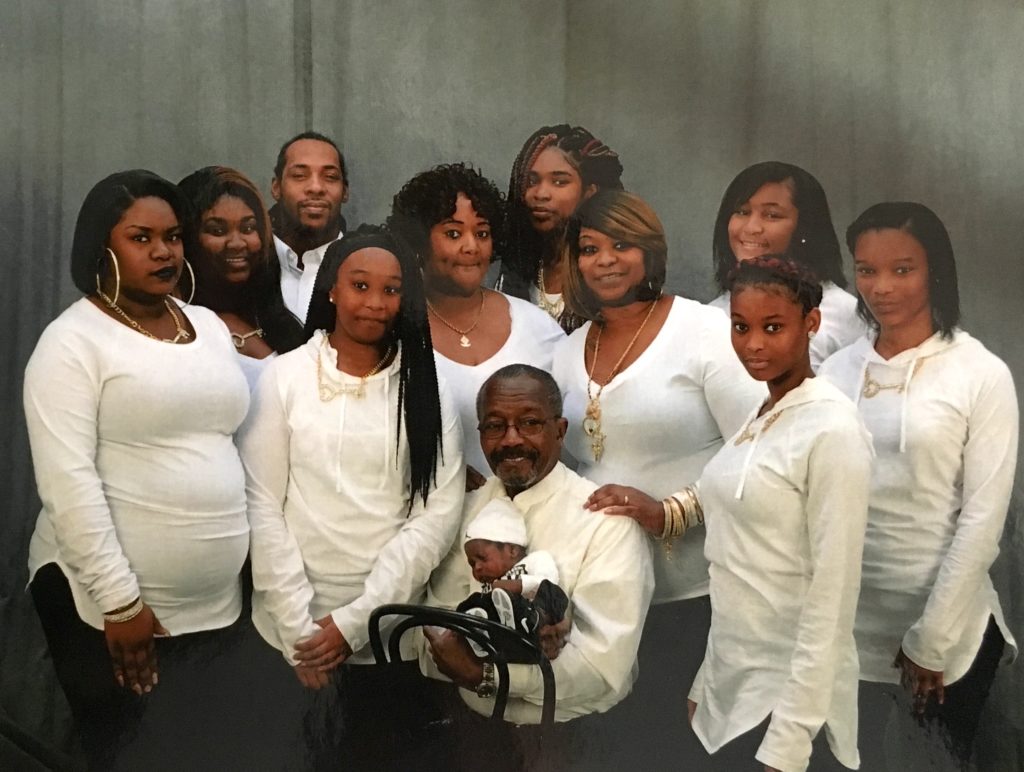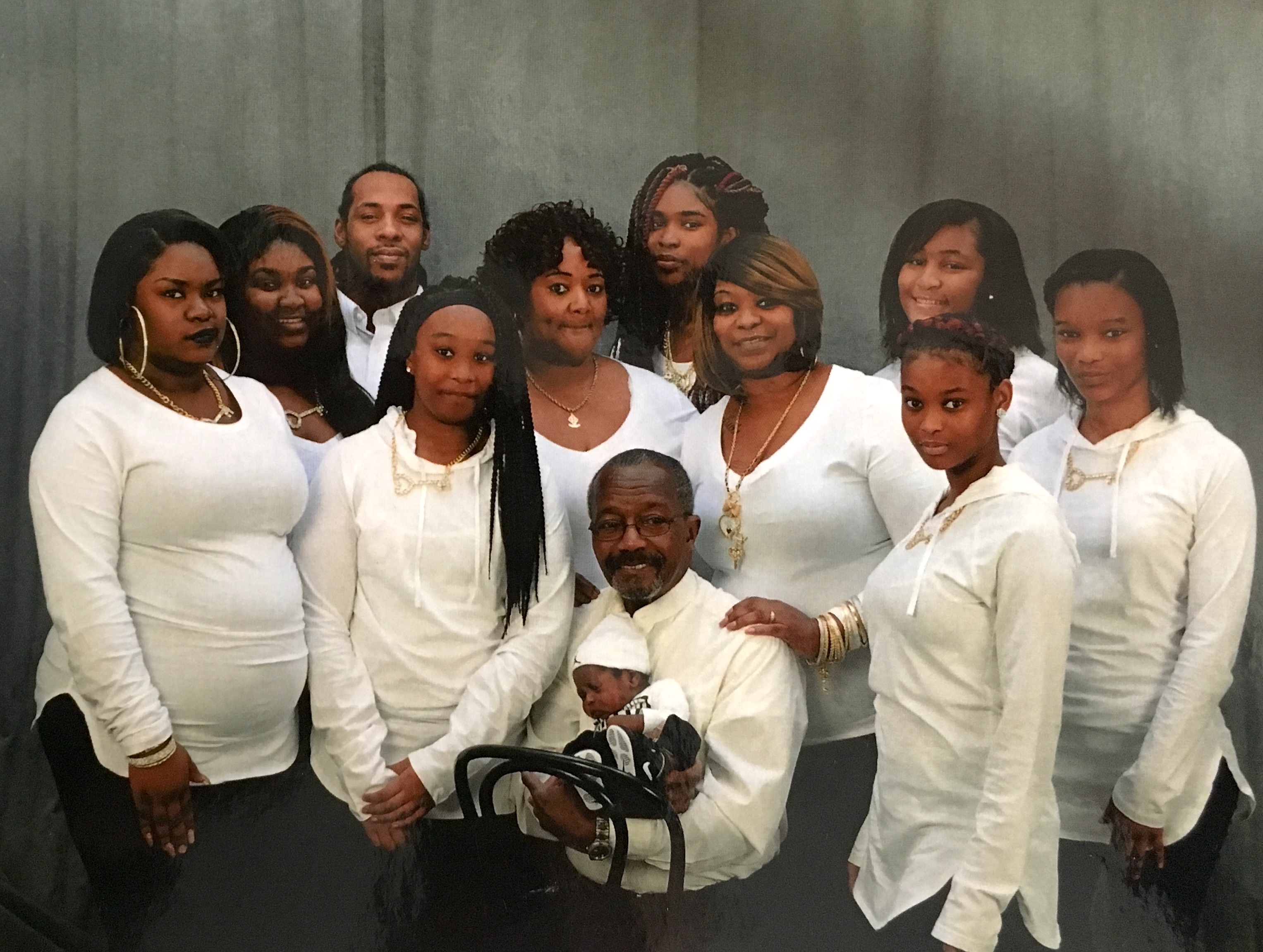by Peter White. This article originally appeared in The Tennessee Tribune.

The Covington/Buchanan family. L-R back row: Senece, Porshia, Angel. 2nd row: Timesha, Rose Jessica, Jane’a. 1st row: Cieaira, Myesha (next to George), George (seated holding Michael), and Marionna.
Rose and George Covington live in a 4-bedroom, two-bath brick house on Meridian St. in East Nashville. They are still doing what they started doing 45 years ago: raising children. Their own two, Tim and Jessica, are grown and out of the house.
They’ve got five grandchildren and one great grandchild, Michael, who is 2 ½. Rose and George are raising them. There is also Rose’s nephew, Jerry, 14. Kids from an extended family of eighty-nine at one time or another have lived in the house on Meridian St. It has four blue metal chairs on the front lawn and a welcome mat by the front door.
Rose is sitting in the living room crowded with presents, a silver artificial Christmas tree, and a fish tank bubbling away in the unused fireplace. Michael gets into something in the dining room and Rose jumps up to scold him, swats his hand, and tells him, “You can’t do that.” He starts to cry.
“That one is rotten,” she says and nods towards the kitchen where one of Michael’s teenage aunties, Myesha, has scooped him up. People say she’s the one who looks most like Rose. “I’m the meanie around here,” Rose says and rolls her eyes at Myesha as if to say, “See what I have to deal with around here? They spoil him.”
“George is the softie,” she confides. She mimics one of the girls bringing him a dirty blouse that she absolutely needs for cheerleading and asks him to wash it for her. George does all the laundry for the family. He worked for 40 years in counter sales for AC/Heating companies and recently retired.
He used to fold all the clothes but it went unappreciated. They did not wind up neatly put away but helter-skelter all over the place.
“I stopped doing that,” he said. Now the kids have to fold their own clothes.
The Covington method is eminently practical if not always easy. Rose didn’t put any of them in the area-zoned schools which have low test scores. Instead, Rose drove the kids to five different magnet schools every morning.
“If they are not happy in school they will drop out,” Rose says. The latest crop went to East Middle and then East High School. Every one of them graduated or will graduate high school and go on to college.
From an early age, Rose started asking them what they want to be when they grew up. If their answers didn’t change, she figured it was a dream worth pursuing. They have done so.
Tim, 45, is a security guard. His son, Le-Timothy, 19, is at Georgia State and wants to be a lawyer. Jessica, 43, manages a Little Caesars franchise and employs five of the kids part-time. Marionna, 19, is at Nashville State. She wants to open her own day care center. Marqualus, 18, is studying nursing and wants a job on a hospital ship, Myesha, 16, likes animals. Rose thinks she’s going to be a zoologist or maybe a veterinarian.
The family has endured its share of hardship and tragedy. Four years ago, six of the children left early one rainy Sunday morning to sing in the church choir. A city bus plowed into them. They lay out on the side of the road in the rain until six ambulances arrived to take them to Vanderbilt hospital.
Cieaira suffered a stroke giving birth to Michael. It paralyzed her left side and she can’t hold him as she would like. Michael , LJ, and Angel were preemies and have respiratory problems. They take aerosol medication through a breathing machine. Timesha, Myesha, and Rose sometimes have to use it. All in all, the family has been blessed with pretty good health.
The family is lucky to have Tenncare, the state’s version of Medicaid. They are not one of the 163,000 Tennesseans in the so-called “coverage gap” who make too much to qualify for Medicaid but too little to afford their own insurance under Obamacare. A recent University of Tennessee study found the number of uninsured has risen two years in a row. The total number of uninsured in Tennessee is now almost 500,000.
On holidays the clan gathers for a meal. It is a big deal and this year Myesha turned sixteen.
The family booked rooms at the Opryland Hotel just before Christmas. They had pictures taken, celebrated at Logan’s for dinner. Rose went back to her room to sleep but the kids explored the hotel and played at the water park for hours.
When they couldn’t get up in the morning Rose didn’t buy their story about going to bed at a decent hour. They came clean and admitted they’d stayed up until about 5 am.
Rose left them there and went home. The kids eventually got up, checked out of their rooms, and continued to explore the sprawling hotel. Then they walked over to the mall, caught an early showing of the new Grinch movie, and had lunch in the food court. Rose picked them up there in the afternoon. The excursion was a celebration of Myesha’s coming of age but it was also an early Christmas present for all the children. Why did they do it?
“Well, one day they will have to take care of me,” says Rose.
Rose and George adopted their grandkids. They could have gotten monthly checks from the Department of Children’s Services (DCS) to foster them but Rose wouldn’t have it. “Money isn’t everything,” she said. The kids call Rose “Mama” and George “Daddy.”
“We make do,” she said.
Tennessee’s foster care system is a lot better now than it used to be. From 2001 to 2017, DCS was under federal oversight. Between 2009 and mid-2012, DCS mishandled some 200 cases of children who died or nearly died while in state custody. Some foster kids died and DCS didn’t even know it. Although DCS is now reformed with a bigger budget and more staff, Rose and George want no part of it.
Rose’s family gets help from Family & Children’s Service (FCS), a nonprofit social service agency founded in 1943. It helps families get the resources they need and FCS serves more than 60,000 Tennesseans each year.
It is not DCS, the state agency which deals with foster care and adoptions although it supports children in DCS custody and families preparing for adoption. For decades FCS provided mental healthcare for thousands of people whose health insurance did not cover it.
Rose is in FCS’s Relative Caregiver Program. She meets regularly with other grandmothers who are raising their kids’ kids. They bring the younger ones with them who are separated into groups by age and they play or take a short field trip while the grown-ups talk. They have a lot to talk about and many of the same problems.
Rose likes the exercise classes and meditation sessions she attends there.
“FCS will help you if you need a new bed or furniture or can’t pay your utility bill,” she said.
That kind of direct aid and respite from the daily grind has been a blessing.
Christmas begins on Christmas Eve for the Covingtons who went over to Rose’s cousin’s house for dinner. When they got back about 8pm, it was all hands on deck. The sweet potatoes are already done but there is turkey and ham to cook, turnip greens, cookies, two kinds of pies, and dressing. But there is only one stove.
“I try to get it all done the night before so we can just heat things up on Christmas Day,” Rose says. Preparations do not cease until about 1am when the kids drift off to bed. Rose is up at 4am to make the family breakfast.
Rose gets out Michael’s shiny green bicycle and puts it next to the tree. “I almost cried when they put it in the back of my car,” said Rose. “He loved it.” The people who run the FCS Relative Caregiver Program bought it for him.
The family went to the Sylvan Street Missionary Baptist Church on Christmas Day. They had dinner that afternoon. The Covingtons are not destitute. They certainly are not rich. But they have the kind of wealth money can’t buy: they have each other.
Peter White wrote this article for the Tennessee Tribune, with the support of a journalism fellowship from the Gerontological Society of America, Journalists Network on Generations and The Commonwealth Fund.
The opinions expressed in this article are those of the author and do not necessarily reflect those of the Diverse Elders Coalition.

